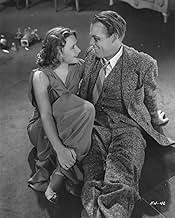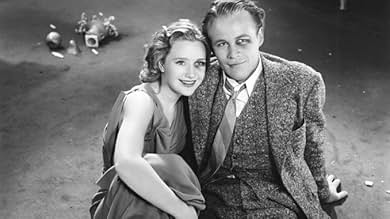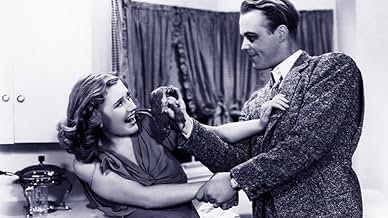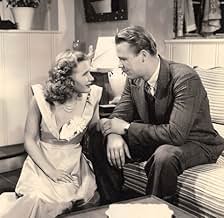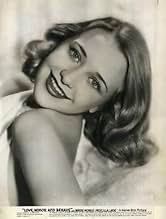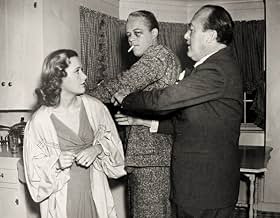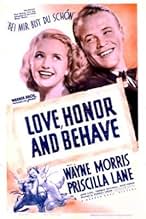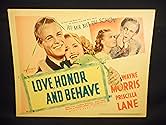Ajouter une intrigue dans votre langueA woman raises her son Ted to be a good loser, in effect creating a weakling who never asserts himself. Even after marrying his childhood sweetheart Barbara and assuming family obligations, ... Tout lireA woman raises her son Ted to be a good loser, in effect creating a weakling who never asserts himself. Even after marrying his childhood sweetheart Barbara and assuming family obligations, Ted cannot bring himself to fight for respect. The worm finally turns when Barbara starts ... Tout lireA woman raises her son Ted to be a good loser, in effect creating a weakling who never asserts himself. Even after marrying his childhood sweetheart Barbara and assuming family obligations, Ted cannot bring himself to fight for respect. The worm finally turns when Barbara starts stepping out on her Milquetoast husband, who then turns out to be not so passive after all... Tout lire
- Réalisation
- Scénario
- Casting principal
- Sally Painter
- (as Barbara O'Neill)
- Party Guest
- (non crédité)
- Party Guest
- (non crédité)
- Boy Playing with Young Ted
- (non crédité)
- Little Girl
- (non crédité)
Avis à la une
It's a shame, too, that 'Lane, Priscilla' (qv)'s performance gets a bit overshadowed by the content of the film. She is an absolute delight and her performance during the end sequence is both hilarious and beautiful at the same time.
This just goes to prove something that I've learned recently while watching movies from the 1930s and 40s: Priscilla Lane makes any movie that much better.
An example of how ridiculous the premise is made when Wayne Morris, the hero, who was raised by his mother, is criticized for preferring tennis to football, by macho old dad. Dad had even criticized Mom for not "fighting" (literally) for him earier in the movie. Well,Wayne falls for childhood girlfriend Priscilla Lane, whose philosophy is not unlike that of his schmuck father's. Priscilla wants a man who looks good, (as does Wayne Morris) but she wants him to be as physical and morally ambiguous as his father was. Very soon tere are marital problems because hero can't find a decent job (it's the depression and he quit med school to marry her). She still wants to party with a male friend while Morris wants her to stay home discuss a job that would mean their living on a lot less.
The "happy ending" and our "lesson in life" is when she manipulates him into physically fighting the guy who comes to take her out, and physically abuses her for not sticking with him. Both sets of parents watching from outside the front window (and are amazingly amused and satisfied) are told by Priscilla Lane's character to "leave them alone" (She appears tojoy his new-found penchant for domestic violence). The "older folks" present think it's all cute.
It's a movie with good actors but it's message makes it really difficult to watch. Unfortunately, I'm afraid that there are some people who may watch this movie and think of it as merely a screwball comedy, with an appropriate message. I pity them.
I did enjoy most of the acting, even though Lane comes on a bit too aggressive for my taste, and very hostile to her mother-in-law. The supporting players, including the child actors, give very competent performances.
The story begins with Ted as a child (Dickie Moore). He's stuck between extremes with his parents. His father wants the kid to be a he-man and a tough guy whereas his mother wants him to be passive and 'a good sport'. Well, his parents soon divorce and mother's influence wins out....and as Ted grows (Wayne Morris), the kid is now a wimpy man who won't stand up for himself. This is much worse because he also won't fight for his marriage and you can see that his wife (Priscilla Lane) is disappointed in him and doesn't think he's much of a man. Will Ted continue this or will he learn to be a man?
The film is entertaining...but also disturbing because the ending essentially says that when your wife is being a jerk, slap her around and show her who's boss. Couldn't there be something a little less extreme?! I do think standing up for right and wrong and fighting is good...but the film definitely crosses the line to spousal abuse. Overall, an interesting but seriously flawed story.
By the way, at the end, the couple being having a fist fight and both INSTANTLY have bruises on them...which is utterly ridiculous...and nasty.
Trouble is this overly generous attitude causes problems for Ted as an adult, particularly with his love life where he doesn't try hard to win Barbara (Lane) despite how he feels. What he needs to do in so many words is 'to stand up for what you want'. So the idea, I believe, is a critique of being both overly generous as a personality trait and of the kind of upper class superiority that patronizes others.
I'm not surprised this was a Warner Bros. production since they were the blue-collar studio of the 30's. (In that regard, catch the revealing very last line.) The plot's a worthy one, but is none too plausibly conveyed among the many principals. At the same time, too much of the movie is too crowded with speaking parts and over-written as a result. Plus, Ted's rather violent turn-around sends a dubious message that's unfortunately papered over by a typical Hollywood ending. Lane over-emotes as the lively ingénue but at least provides spark, while Morris smiles affably while mainly standing around, that is, when not throwing a big tennis match. Hard to believe from this that he was a highly decorated WWII pilot before passing away at an early age.
Anyway, the movie handles tricky material rather awkwardly and without generating much audience involvement. Too bad.
Le saviez-vous
- AnecdotesThomas Mitchell (Dan Painter) and Barbara O'Neil (Sally Painter) played Tara plantation owners, and parents of Scarlett (Vivien Leigh), Gerald and Ellen O'Hara in Gone with the Wind (1939).
- Citations
Barbara Blake: Ted is the only man I ever saw I could stand over orange juice and coffee. You know, Jim, it makes a lot of difference how they look in the morning.
Jim Blake: Barbara!
Barbara Blake: I read that somewhere, darling.
- Bandes originalesBei Mir Bist Du Schön
(1932)
Music by Sholom Secunda
Original lyrics by Jacob Jacobs
English lyrics by Sammy Cahn and Saul Chaplin
Sung by Priscilla Lane (uncredited)
Variations played throughout as part of the score
Meilleurs choix
Détails
- Date de sortie
- Pays d’origine
- Langue
- Aussi connu sous le nom de
- Everybody Was Very Nice
- Lieux de tournage
- Reno, Nevada, États-Unis(establishing shot, archive footage)
- Société de production
- Voir plus de crédits d'entreprise sur IMDbPro
- Durée1 heure 11 minutes
- Couleur
- Mixage
- Rapport de forme
- 1.37 : 1

